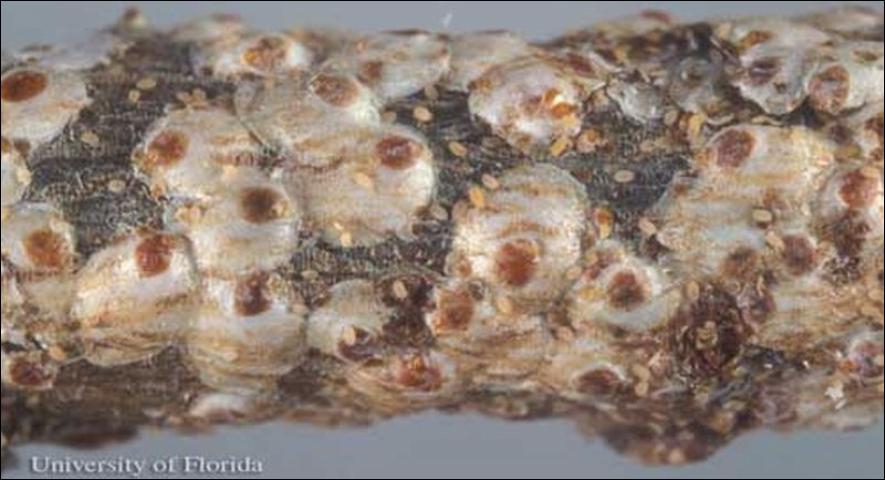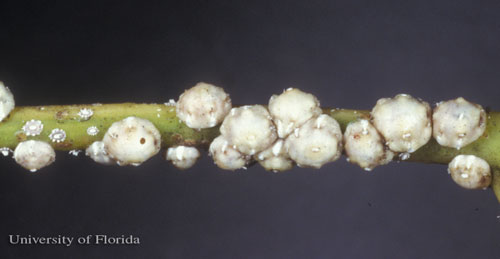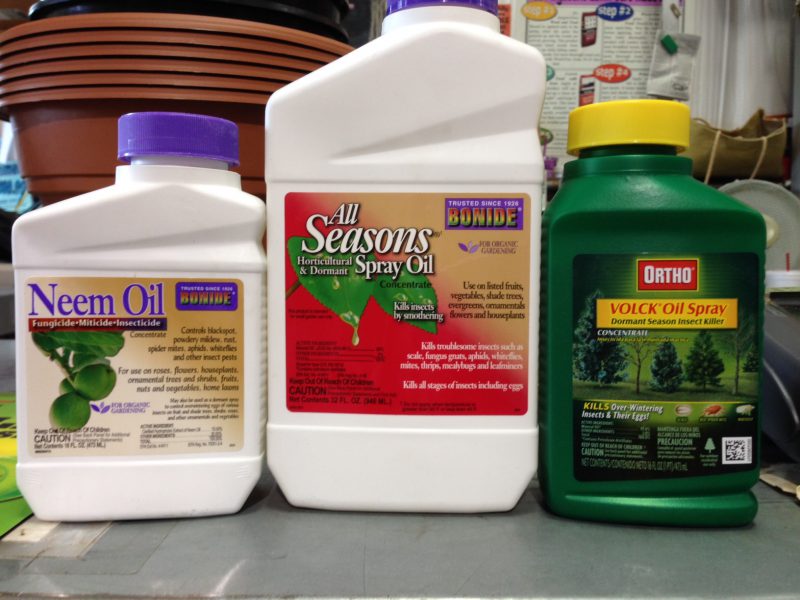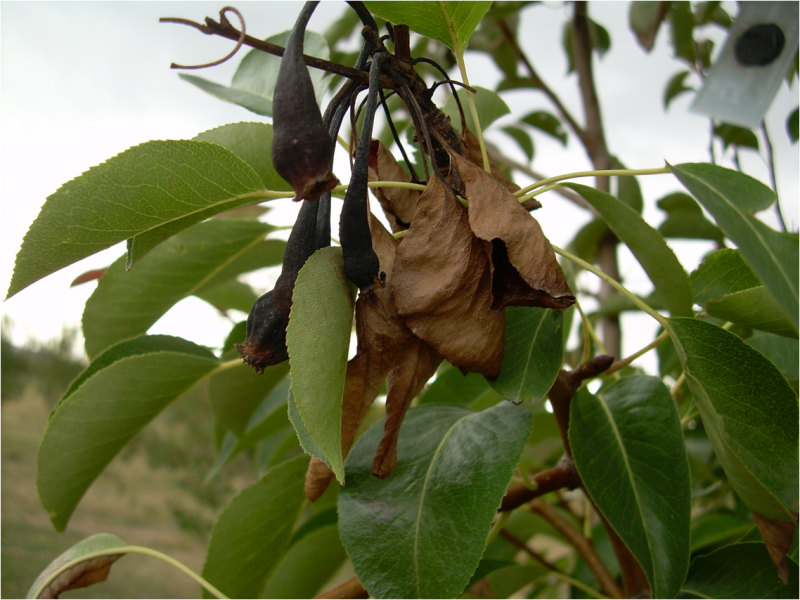Currently, growers are harvesting lettuce, broccoli, cabbage and other winter vegetable crops, and not thinking about spraying fruit trees and berry bushes for insects and diseases. February is prime time to apply dormant sprays to aid in the prevention of insect and disease issues later. In fact, the recent warm weather has triggered fruit trees to begin blooming, so if growers intend to apply dormant sprays, they must do so soon.

Adults and immatures of the white peach scale, Pseudaulacaspis pentagona (Targioni) Caption and Image Credit: Lyle J. Buss, UF / IFAS Entomology
–
What are dormant sprays?
Dormant sprays are applied to control insect and disease pathogens during the winter season. Many insects overwinter on trees and shrubs, either as eggs or immobilized in a protective shell (scale insects). Many fungal or bacterial diseases overwinter on last years’ foliage or on stems and branches. Horticultural oils, Sulfur and Copper all control different insects and pathogens, but can be applied during winter dormancy. Horticultural oils work by smothering the eggs of some insect species or encapsulated scale insects. Since they cannot breathe, they die. Sulfur compounds kill dormant or latent disease spores, and copper compounds kill bacterial cells that cause canker or fire blight.
Scale insects are most often seen on citrus trees or blueberry bushes, but may be seen on pear, peach, apple, fig or persimmon trees as well. There are many types, but most can be effectively controlled with horticultural oil. Horticultural Oil to control scale, in particular, is usually a petroleum product that acts to deprive scale insects of oxygen and smother them to death. Applications should be timed correctly, since horticultural oils will burn plants once outdoor temperatures reach 94° F. A good rule of thumb to minimize leaf damage is to apply horticultural oil on cool and cloudy days. Always consult the label of each individual product before applying, and never apply more than the recommended amount. This last statement is especially crucial for horticultural oil applications, since increased rates are highly likely to damage plants.

Adult Florida wax scales, Ceroplastes floridensis Comstock. A few nymphs are visible at the left. Image and Caption Credit: Lyle J. Buss, UF / IFAS Entomology
When developing a plan to prevent disease in the fruit orchard or berry patch, dormant sprays containing copper or sulfur should be included because they actually kill latent fungal spores that are ready to begin infecting new leaves once plants break dormancy. Caution should be exercised, because these sprays may burn tender young plant tissue, so they can only be used when the plant is not actively growing. These preventative sprays can delay disease incidence in early spring, and allow for reduction or elimination of regular fungicide applications. The old adage “an ounce of prevention is worth a pound of cure” surely applies to these situations. Some sulfur and copper compounds are labeled for actively growing tissue, but care must be used to time application to avoid extreme heat.
There are several products on the market for dormant applications
- Dormant oil is a type of horticultural oil, made of refined petroleum products, for application on trees or shrubs when the trees are not actively growing. It has been in use for over 100 years. They are effective in the suppression of scale insects and mites. Care must be used to not apply them when daytime temperatures are above 75 degrees or night temperatures below 28 degrees.
- Other horticultural oils exist that can be applied during the growing season to control soft-bodied insects, but not during extremely hot weather. Many different brands exist; some are certified organic by OMRI. They can be purchased at most garden centers, but the best selection is usually found at your independent nursery or farm store.

Both dormant and spring season horticultural oil sprays – Image Credit Mary Salinas , UF / IFAS Extension
–
Dormant fungicides can be classified into two groups. Those that contain copper and those that contain sulfur.
- The most common preventative remedy for fungal disease is lime-sulfur. It is applied to dormant plants and actually sanitizes the stem, killing all fungal spores. It cannot be used during the growing season since it burns leafy tissue. Caution must be taken when mixing and loading since these acidic products can burn the skin. Wear chemical resistant gloves when applying (bought at your local hardware store for $4.00-$10.00), safety goggles, and follow all label directions carefully. Also, never apply lime-sulfur within one week of horticultural oil applications. It should be applied in early to mid-February, avoiding hard freezes for the 24 hours around application time. Lime-Sulfur may be difficult to find locally due to supply chain issues, but may be ordered online.
- Dormant copper sprays are effective on both bacterial and fungal pathogens, and are used primarily on fruit crops for the suppression of diseases including fire blight, bacterial leaf spot, powdery mildew, downey mildew and anthracnose. One popular option, the “Bordeaux Mixture” blends copper with lime. This lime reduces the acidic nature of the copper, thus reducing tissue damage when applied to plants. Always read the label for proper personal protective equipment and dosage rates, to avoid copper toxicity.
–
For more information, contact your local extension agent or consult these extension publications:
Disease Management Strategies
Pest Control Using Horticultural Oils
- Steps to Remedy Non-Productive Pecan Orchards - June 30, 2023
- If Not Disease, Then What? Abiotic Vegetable Disorders - June 24, 2022
- Dormant Sprays Protect Fruit Trees from Future Insects and Diseases - January 28, 2022

